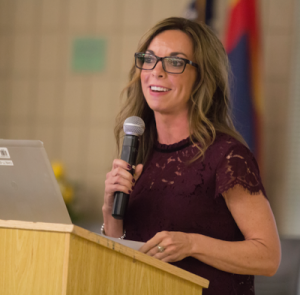Podcast: Play in new window | Download (Duration: 32:45 — 37.5MB)
Young men are 4X more likely to die of suicide than young women
The suicide rate for boys ages 15 to 19 grew by 30 percent from 2007 to 2015
Suicide is now the second leading cause of death for ages 10-24
No one wants to think or talk about suicide, but as people who care deeply about the well-being of boys, we’d be remiss to stay silent. This episode is a tough, but vitally important, one.
Trigger warning: This episode includes frank conversations about suicide and includes non-graphic descriptions of the circumstances surrounding some suicides

Our guest, Katey McPherson, is a boy advocate, educator and consultant who turned her attention to suicide prevention after a slew of teenage boys in Arizona committed suicide.
“Just in my 20 mile radius, we’ve lost 32 boys in 20 months,” says McPherson.
Most, she said, had experienced a “significant life crisis” in the weeks previous such as a breakup, academic or athletic failure or altercation with the law. To many adults, these incidents may seem relatively minor. But in the life of tween or teen, these are major events.
“The reality is, some of these children have never failed. And so when they have a failure, it is epic,” McPherson explains. Social networking can further amplify kids’ feeling of failure, as news of kids’ achievements and failures quickly spread.
Unfortunately, adults sometimes unwittingly make things worse by taking away their child’s phone or keeping their child apart from friends. Teens rely on one another for social support, and use their phones to connect. Without their phones and friends, they feel alone and isolated. Trapped in their thoughts, it’s all too easy to move from depression to suicidal ideation to suicide.
Teenage boys’ brains are immature. They don’t process the world the same way we do. They’re impulsive. We have to remember those facts when interacting with our teen boys. We have to listen, learn and love.
Above all, pay attention to your gut instincts. “If your mom or dad radar is going off, there’s something wrong,” McPherson says. “Don’t dismiss your mom or dad radar. That’s where we go wrong.” Don’t dismiss your concerns; act instead.
If you or someone you know is struggling with depression, there are resources for you by calling the National Suicide Prevention Lifeline at 1-800-273-8255 or visiting suicidepreventionlifeline.org.

In this episode, Jen, Janet & Katey discuss:
- Parenting strategies that can decrease the risk of suicide and build resiliency
- The importance of discussing socio-emotional wellness
- Why it’s CRUCIAL to discuss suicide, depression and mental health with your boys
- Why asking about suicide WILL NOT trigger suicide — but may save a life
- How to tell the difference between teenage angst & depression
- Red flags, including disrupted sleep patterns and changes in behavior, hygiene, nonverbal communication and device usage
- Why you should be on alert after breakups, academic and athletic failures
- How a growth mindset can build coping skills and resilience
- How kids signal their despair on social media
- The importance of family media rules and a central charging station
- How to help your kids recognize — and respond to — friends’ cries for help
- The importance of the village — why parents must work together to keep kids safe
- What to do if your son is suicidal (Go immediately to a hospital with an adolescent behavioral center, or call 911)
Comments shared with us after podcast went live:
“Janet and Jennifer –
I listen to your podcast every week in the car on the way to or from work and I am a big fan. Last Thursday, I called in sick to work, so didn’t get to listen to this incredible episode. Hours later, my own teen boy was moving from ideation toward taking his own life, and we were alerted thanks to a friend who preferred to reach out for help for him rather than to “keep his trust” as a confidant. We will always be grateful. He is out of the woods for now, and getting the help he needs, but as I listened to your podcast today, I realized that so much of this information would have helped me understand what was happening as it unfolded. I can’t emphasize enough the need to pay attention – and respond to – the warning signs and act on them. Also, friends play a huge role in commiserating, but are ill equipped to make the right call when a peer is sinking into despair. Here’s hoping you’ll soon put together an episode on the aftermath of a thankfully failed attempt and how to help our boys and their communities to heal.”
and
“This podcast is absolutely outstanding. It’s heart-breaking but it’s important to know reality and I really appreciate these on-the-ground statistics and advisories. Thank you.”
and
“Oh my goodness, this makes me cry. I will be more aware and vigilant with my kids and those I meet. We just moved to a new place and my son is 10.”
Links we mentioned (or should have) in Episode 146:
National Suicide Prevention Lifeline — 1-800-273-8255
The American Foundation for Suicide Prevention
Katey McPherson on Facebook
What are the Symptoms of Depression in Teenagers? – article from the Child Mind Institute
How to Recognize Signs of Depression in Your Teens
Episode 125: Anxiety and Depression in Teens
Andy Hull’s Sunshine Foundation — nonprofit founded by a family who lost their son to suicide
How to Talk to Kids About Anything — Dr. Robyn Silverman’s parenting podcast
Aftershock: Hope, Help and Healing in the Wake of Suicide by Candy Arrington and David Cox
Radio Interview with Dr. Krasnow, Arizona State University, “Teen Suicide in Arizona”